Scientific News
Are most people honest?
 You’re walking down the street and find a lost wallet. What do you do? Researchers decided to voluntarily create this situation in different cities throughout 40 countries. In addition to finding out that reactions varied between different populations, the goal was to see whether the psychological burden of seeing oneself as a thief had an influence on behavior. Can this burden outweigh economic benefits?
You’re walking down the street and find a lost wallet. What do you do? Researchers decided to voluntarily create this situation in different cities throughout 40 countries. In addition to finding out that reactions varied between different populations, the goal was to see whether the psychological burden of seeing oneself as a thief had an influence on behavior. Can this burden outweigh economic benefits? The research team composed of A. Cohn (University of Michigan), D. Tannenbaum (University of Utah), and C. Lukas Zünd and M.A. Maréchal (University of Zurich) wanted to test people’s honesty in a more realistic environment rather than a laboratory setting. Laboratory ...
Could an attention disorder and hyperactivity be the explanation behind Leonardo da Vinci’s genius?
 While the Louvre Museum in Paris prepares to celebrate the 500th anniversary of the death of Leonardo da Vinci, the genius of this artist who produced some of the greatest masterpieces of all time remains somewhat of a mystery. A recent study published in the journal Brain puts forth a new hypothesis to explain his incredible creativity and multitude of unfinished projects: did Leonardo da Vinci have an attention disorder and ADHD?
While the Louvre Museum in Paris prepares to celebrate the 500th anniversary of the death of Leonardo da Vinci, the genius of this artist who produced some of the greatest masterpieces of all time remains somewhat of a mystery. A recent study published in the journal Brain puts forth a new hypothesis to explain his incredible creativity and multitude of unfinished projects: did Leonardo da Vinci have an attention disorder and ADHD?Painter, sculptor, musician, architect, geologist, mathematician, anatomist, botanist, philosopher… Reading this (non-exhaustive) list, one may wonder how this Florentine, revered by popes and kings alike, managed to excel in so many domains. Marco ...
Do sleep and mood affect working memory performance?
 Remembering an email address long enough to write it down, following a conversation, or remembering the beginning of a sentence you’ve just read. Working memory makes these tasks possible. A recent study conducted by a team of psychologists has shed light on strong connections between working memory and sleep, mood, and age. What are the effects of these three factors on working memory?
Remembering an email address long enough to write it down, following a conversation, or remembering the beginning of a sentence you’ve just read. Working memory makes these tasks possible. A recent study conducted by a team of psychologists has shed light on strong connections between working memory and sleep, mood, and age. What are the effects of these three factors on working memory?A component of short term memory, working memory is used to store, temporarily maintain, and manipulate useful information for performing cognitive tasks, such as reasoning and comprehension. It plays a crucial role in many cognitive functions (language, action planning, etc.). Research has ...
Can wasps make deductions?
 Michael is shorter than Daniel and Daniel is shorter than Jennifer, so Michael is shorter than Jennifer. From 4-5 years of age, children are able to reach this conclusion through something known as transitive inference. This logical reasoning has also been demonstrated in vertebrate animals (monkeys, rats, birds, and fish). For the first time, a study has shed light on this capacity for deduction in an invertebrate: the paper wasp. Here’s how...
Michael is shorter than Daniel and Daniel is shorter than Jennifer, so Michael is shorter than Jennifer. From 4-5 years of age, children are able to reach this conclusion through something known as transitive inference. This logical reasoning has also been demonstrated in vertebrate animals (monkeys, rats, birds, and fish). For the first time, a study has shed light on this capacity for deduction in an invertebrate: the paper wasp. Here’s how...As the authors of this research point out, animal species that show complex social behavior seem to be the most likely to develop transitive inference. In invertebrates, the skill has already been studied unsuccessfully in honeybees. ...
Can synthesized speech be generated from brain activity?
 You're undoubtedly familiar with the late astrophysicist, Stephen Hawking. While his condition left him unable to speak, he could communicate through a device, using eye and facial movements to compose each word, letter by letter. New research is allowing faster speech synthesis technology to be developed that more closely simulates the natural flow of speech. So how does this “brain decoder” work?
You're undoubtedly familiar with the late astrophysicist, Stephen Hawking. While his condition left him unable to speak, he could communicate through a device, using eye and facial movements to compose each word, letter by letter. New research is allowing faster speech synthesis technology to be developed that more closely simulates the natural flow of speech. So how does this “brain decoder” work?Though we’re largely unaware of it, speaking requires very precise, multidimensional coordination and control of the vocal tract’s articulatory muscles, which extend from the glottis to lips. The process of speaking is based on a set of complex, simultaneous, and fluid movements ...
Does the brain have a Pokémon area?
 A scientific study on Pokémon? You're not the only one to be skeptical of the idea. Project initiator Jesse Gomez also had trouble convincing his colleagues. According to the neuroanatomist, there may be an area of the brain specifically designed to recognize hundreds of Pokémon characters. See how this unusual research can teach us more about the way our visual cortex works.
A scientific study on Pokémon? You're not the only one to be skeptical of the idea. Project initiator Jesse Gomez also had trouble convincing his colleagues. According to the neuroanatomist, there may be an area of the brain specifically designed to recognize hundreds of Pokémon characters. See how this unusual research can teach us more about the way our visual cortex works.Pokémon video games have known unwavering success since the late 90s, and they’re still very popular today. The study’s lead author, Jesse Gomez, is himself a big fan: “I played it nonstop starting around age 6 or 7. I kept playing throughout my childhood. What was unique about Pokémon is that ...
Can doing crosswords and sudoku help optimize our cognitive health?
 Some of you readers undoubtedly love crosswords or sudoku, or even both! A recent study, the largest to date, has revealed the possible beneficial effects of these reflective activities on cognitive function in seniors. The research has led to the publication of two articles in the International Journal of Geriatric Psychiatry. So, is it time for everyone else to start puzzling over letter and number grids?
Some of you readers undoubtedly love crosswords or sudoku, or even both! A recent study, the largest to date, has revealed the possible beneficial effects of these reflective activities on cognitive function in seniors. The research has led to the publication of two articles in the International Journal of Geriatric Psychiatry. So, is it time for everyone else to start puzzling over letter and number grids?More than 19,000! That's the (rather impressive) number of participants enrolled in the study presented here. All of these over-50-year-old subjects registered with Protect, an online platform managed by the University of Exeter and King’s College in London. Each ...
Do our brains make us naturally selfish?
 During a party, as you're chatting away with other guests, you suddenly turn around at the sound of your name. This is an all-to- familiar way of capturing your attention. Indeed, we are primarily interested in stimuli that relate to us personally, something known as the "self-referential bias." Based on this observation, researchers wanted to test if a similar phenomenon could be seen in the brain. It was a chance to discover whether our brain makes us naturally self-centered…
During a party, as you're chatting away with other guests, you suddenly turn around at the sound of your name. This is an all-to- familiar way of capturing your attention. Indeed, we are primarily interested in stimuli that relate to us personally, something known as the "self-referential bias." Based on this observation, researchers wanted to test if a similar phenomenon could be seen in the brain. It was a chance to discover whether our brain makes us naturally self-centered… Tobias Egner, an Associate Professor in the Department of Neuroscience at Duke University (United States) and one of the study’s co-authors, says that we tend to prefer external stimuli that are ...
Do we have an internal compass?
 We all know that migratory birds and sea turtles have a geomagnetic sense that supports their sense of direction. This sensory modality has been studied in vertebrates and even in certain invertebrates (like bees and lobsters). It has long been believed that humans also possess a form of magnetoreception, but the ability has never been demonstrated scientifically. A recent study has just revealed that our brain may come with an internal compass...
We all know that migratory birds and sea turtles have a geomagnetic sense that supports their sense of direction. This sensory modality has been studied in vertebrates and even in certain invertebrates (like bees and lobsters). It has long been believed that humans also possess a form of magnetoreception, but the ability has never been demonstrated scientifically. A recent study has just revealed that our brain may come with an internal compass...For migratory animals, magnetoreception (their ability to detect Earth’s magnetic field) allows them to build a sort of “map” that helps them navigate. In the 1980s, researchers attempted to demonstrate this ability in humans. For ...
Can team sports combat depression?
 Many of our posts have praised the virtues of regular physical activity on our cognitive health. This new research carried out at Washington University in Saint Louis highlights a potential link between participation in team sports and reducing symptoms of depression in young boys. But why would team sports have a positive impact on boys’ moods?
Many of our posts have praised the virtues of regular physical activity on our cognitive health. This new research carried out at Washington University in Saint Louis highlights a potential link between participation in team sports and reducing symptoms of depression in young boys. But why would team sports have a positive impact on boys’ moods?If you take a look at co-author Lisa Gorham’s web page (on Washington University's website), you’ll see that she’s a sports addict and captain of the cross-country and track teams. The learnings she's gathered from this experience clearly inspired her to conduct this research on adolescent mental health. Inspired by her coach’s ...
Is forgetting easier than remembering?
 All of us have at least a few memories we’d like to erase. But deleting them from isn’t always easy. According to a study conducted by researchers at the University of Texas at Austin, forgetting something may require more mental effort than trying to remember it. How did they make this discovery?
All of us have at least a few memories we’d like to erase. But deleting them from isn’t always easy. According to a study conducted by researchers at the University of Texas at Austin, forgetting something may require more mental effort than trying to remember it. How did they make this discovery?Our memories are not static; they are dynamic constructs of the brain that are regularly updated and reorganized according to our life experiences. We are constantly remembering and forgetting information, most often while we sleep. Previous studies have shown that forgetting plays a vital role in preserving memories and eliminating unwanted information. Traditionally, intentional ...
Animal seduction: does intelligence beat looks?
 Until recently, few studies on birds have looked at how intelligent behaviors in males can be used to attract females. But this is exactly what Dutch and Chinese researchers examined in their research to determine whether intelligence could win out over appearance when it comes to finding a mate. Here are the findings of this Darwin-inspired research.
Until recently, few studies on birds have looked at how intelligent behaviors in males can be used to attract females. But this is exactly what Dutch and Chinese researchers examined in their research to determine whether intelligence could win out over appearance when it comes to finding a mate. Here are the findings of this Darwin-inspired research. The Budgerigar (Melopsittacus undulatus) lives in all arid and semi-arid areas of Australia, where finding food is sometimes difficult. An individual’s ability to find food may thus be of great value… A team of researchers from the University of Beijing (China) and Leiden (the Netherlands) decided to specifically study how ...
Does regular aerobic exercise improve cognitive abilities?
 A new study is shedding light on the benefits of physical exercise on our cognitive health. Published in the medical journal Neurology in January 2019, the research indicates that activities such as walking or cycling have a positive effect on executive function. How were the scientists able to pinpoint the link between aerobic exercise and our thinking skills?
A new study is shedding light on the benefits of physical exercise on our cognitive health. Published in the medical journal Neurology in January 2019, the research indicates that activities such as walking or cycling have a positive effect on executive function. How were the scientists able to pinpoint the link between aerobic exercise and our thinking skills?Our body produces energy both aerobically and anaerobically. The two types of metabolism are distinguished by whether or not they use oxygen produced by breathing. By drawing from a reserve that mobilizes different substrates (mainly carbohydrates and lipids), aerobic metabolism releases energy relatively slowly but ...
Rocking isn’t just for babies
 The days when our parents rocked us in their arms are far behind us… This soothing swinging motion helped us fall asleep. But Swiss scientists wondered if this rocking motion could be beneficial even after these tender years. For their study, they invited adults to be rocked in their laboratory. What effects did it have on their sleep and memory?
The days when our parents rocked us in their arms are far behind us… This soothing swinging motion helped us fall asleep. But Swiss scientists wondered if this rocking motion could be beneficial even after these tender years. For their study, they invited adults to be rocked in their laboratory. What effects did it have on their sleep and memory? As early as 2011, Laurence Bayer and her colleagues demonstrated the possible benefits of a slight rocking motion on falling asleep for a nap. This new research, led by L. Bayer and S. Schwartz, involved consolidating these results by studying whether the positive effects could be generalized to longer periods of ...
Are women’s brains younger than men’s?
 On a morphological level, research has already shown that men's and women’s brains are different. A recent study from Washington University School of Medicine in Saint Louis has shed light on metabolic differences between the two. Indeed, sex appears to have an influence on brain aging...
On a morphological level, research has already shown that men's and women’s brains are different. A recent study from Washington University School of Medicine in Saint Louis has shed light on metabolic differences between the two. Indeed, sex appears to have an influence on brain aging...In humans, normal aging is associated with a decrease in brain metabolism. We know that the brain metabolizes glucose, but the way it’s used changes as we age. As babies and children, our brain draws on this "fuel” to develop and mature. This process is called aerobic glycolysis. The remaining sugar is burned to fuel the daily tasks of thinking and acting. As adolescents and adults, a ...
Are crows feathered MacGyvers?
 Crows are certainly fascinating creatures. In previous articles, we had the chance to highlight their impressive cognitive abilities. This new study by the Max Planck Institute of Ornithology and the Oxford University offer new evidence of these abilities by demonstrating that these birds possess a skill previously observed only in humans and great apes: the creation of compound tools. Are crows indeed as clever as MacGyver?
Crows are certainly fascinating creatures. In previous articles, we had the chance to highlight their impressive cognitive abilities. This new study by the Max Planck Institute of Ornithology and the Oxford University offer new evidence of these abilities by demonstrating that these birds possess a skill previously observed only in humans and great apes: the creation of compound tools. Are crows indeed as clever as MacGyver?Previous studies have already shown that crows’ planning skills are sophisticated enough to allow them to solve puzzles in several stages and to use a tool (a stick) to obtain food. The current study investigated whether the birds could build an object ...
Why does our brain stay attentive even when we’re asleep?
 We generally consider sleep as a loss of consciousness during which we stop interacting with our environment. But perhaps you’ve had the experience of falling asleep on a train or bus only to wake up just as your station is being announced. Researchers at the CNRS and ENS Paris, in collaboration with Monash University (Australia), recently showed that our brains remain attentive even during sleep. Read on to find out why.
We generally consider sleep as a loss of consciousness during which we stop interacting with our environment. But perhaps you’ve had the experience of falling asleep on a train or bus only to wake up just as your station is being announced. Researchers at the CNRS and ENS Paris, in collaboration with Monash University (Australia), recently showed that our brains remain attentive even during sleep. Read on to find out why.It may not seem like we're able to perceive surrounding noises as we sleep. But previous experiments have shown that we are still able to discriminate certain sounds during sleep. For example, we’re more likely to wake up if someone says our own name rather ...
Do bees know how to add and subtract?
 Bees have some new surprises in store for us! Having already proven that bees understand the concept of “zero,” the same team of scientists, from the Royal Institute of Technology at the University of Melbourne (Australia) and the CNRS Laboratory at the University of Toulouse III (France), recently showed that bees can also add and subtract. How were the researchers able to demonstrate the arithmetic skills of these insects?
Bees have some new surprises in store for us! Having already proven that bees understand the concept of “zero,” the same team of scientists, from the Royal Institute of Technology at the University of Melbourne (Australia) and the CNRS Laboratory at the University of Toulouse III (France), recently showed that bees can also add and subtract. How were the researchers able to demonstrate the arithmetic skills of these insects?A number of animals have been shown to have some understanding of numbers at a basic level. The scientific community makes a distinction between species that can discriminate quantities and those that use numerical (precise, symbolic) cognition. Numerical ...
Does believing you’re a multi-tasker improve performance?
 While the “myth of multitasking” is still going strong, research has shown that we can't actually do several things at once. Our brain isn’t capable of performing various tasks in a truly simultaneous manner. Nevertheless, a study recently published in Psychological Science suggests that simply believing that we’re good at multitasking could make us more efficient. Could this “myth” have positive effects?
While the “myth of multitasking” is still going strong, research has shown that we can't actually do several things at once. Our brain isn’t capable of performing various tasks in a truly simultaneous manner. Nevertheless, a study recently published in Psychological Science suggests that simply believing that we’re good at multitasking could make us more efficient. Could this “myth” have positive effects?Whether at work or at home, we are regularly required to perform several tasks at the same time. Living in the digital age only reinforces our impression of being able to manage this “simultaneity.” For example, we can reply to an email while talking on the phone. ...
The woman who could no longer hear male voices
 Imagine waking up one morning to find that you could no longer hear your partner's voice, while still perceiving all the other sounds in the house. Some people might see this as a relief and adjust easily, but for most of us, it would be quite baffling upsetting. How can hearing loss only apply to male voices? The answer can be found through this surprising clinical case.
Imagine waking up one morning to find that you could no longer hear your partner's voice, while still perceiving all the other sounds in the house. Some people might see this as a relief and adjust easily, but for most of us, it would be quite baffling upsetting. How can hearing loss only apply to male voices? The answer can be found through this surprising clinical case.That morning in Xiamen, a city located on the southeast coast of China, Mrs. Chen, a young woman, woke up and realized she couldn’t hear what her boyfriend was telling her. Listening to surrounding sounds, she discovered that only part of her hearing has been affected, and apparently it was her boyfriend that ...
Are fruit, veggies and orange juice good for memory?
 Science regularly praises the health benefits or warns us of the dangers of consuming various foods. The same food or beverage may even be both lauded and vilified from one year to the next, and from one study to another (coffee, for example). But the results of the current study are based on data collected from a population of nearly 28,000 men over a period of 20 years. Here’s a summary of the research recently published in Neurology.
Science regularly praises the health benefits or warns us of the dangers of consuming various foods. The same food or beverage may even be both lauded and vilified from one year to the next, and from one study to another (coffee, for example). But the results of the current study are based on data collected from a population of nearly 28,000 men over a period of 20 years. Here’s a summary of the research recently published in Neurology.Changzheng Yuan and her colleagues at Harvard T.H. Chan School of Public Health wanted to assess the potential link between long term fruit and vegetable consumption and subjective cognitive function (SCF). They followed 27,842 men (all ...
Can stimulating the brain alleviate chronic pain?
 A great number of people suffer from lower back pain. The pain can begin at any age with peak onset occurring during adolescence or around age 45. A team of researchers from the University of North Carolina recently published a study that could prove promising in the treatment of this form of chronic pain without the need for drugs. What if targeted brain stimulation could relieve chronic back pain?
A great number of people suffer from lower back pain. The pain can begin at any age with peak onset occurring during adolescence or around age 45. A team of researchers from the University of North Carolina recently published a study that could prove promising in the treatment of this form of chronic pain without the need for drugs. What if targeted brain stimulation could relieve chronic back pain?Several studies have shown that chronic pain is the leading cause of disability worldwide. According to the authors of the present study, by focusing on the peripheral causes of pain, most of these studies have overlooked the role played by brain activity in the disease. F. Fröhlich, ...
Can breathing influence memory?
 We usually breathe through the nose, but switch to mouth breathing when we have a cold or during intense exercise. Swedish and Dutch scientists explored these two ways of breathing in order to determine which one was more beneficial to memory formation. Specifically, the research focused on olfactory memory consolidation.
We usually breathe through the nose, but switch to mouth breathing when we have a cold or during intense exercise. Swedish and Dutch scientists explored these two ways of breathing in order to determine which one was more beneficial to memory formation. Specifically, the research focused on olfactory memory consolidation. Three main steps are involved in memory: encoding, consolidation, and retrieval. Encoding involves the ability to acquire new information from our senses. Consolidation allows us to maintain memories over time. Finally, through retrieval, we can extract and recall previously learned and stored information. Many studies have already highlighted the role of ...
Do dogs understand our words?
 “Many dog owners think that their dogs know what some words mean, but there really isn’t much scientific evidence to support that,” says Ashley Prichard, co-author of the study that will be discussed in this article. How can we be sure that when a dog gets excited upon hearing "rabbit," he’s really imagining the animal and understands the meaning of the word? This research conducted at Emory University in Atlanta unravels this mystery...
“Many dog owners think that their dogs know what some words mean, but there really isn’t much scientific evidence to support that,” says Ashley Prichard, co-author of the study that will be discussed in this article. How can we be sure that when a dog gets excited upon hearing "rabbit," he’s really imagining the animal and understands the meaning of the word? This research conducted at Emory University in Atlanta unravels this mystery...To the extent that canines are able to obey verbal commands, they have the ability to process certain aspects of human language. But associating a word with an action (“fetch!)” doesn’t necessarily mean the animal understands ...
Is our sense of direction related to our sense of smell?
 Recent research suggests that the main purpose of olfaction may be to help us navigate. According to this “olfactory spatial hypothesis,” our sense of smell may have evolved to help us locate ourselves in space. With this in mind, a Canadian study sought to explore the link between our ability to identify odors and our spatial memory. It was an opportunity to find out whether having a highly developed sense of smell could help us find our bearings...
Recent research suggests that the main purpose of olfaction may be to help us navigate. According to this “olfactory spatial hypothesis,” our sense of smell may have evolved to help us locate ourselves in space. With this in mind, a Canadian study sought to explore the link between our ability to identify odors and our spatial memory. It was an opportunity to find out whether having a highly developed sense of smell could help us find our bearings...While not all animals are able to see and hear, most use smells to orient themselves, find food, and avoid predators. In addition, scientists have already found that in mammals, birds, reptiles, and fish, the size of the olfactory ...
Ever heard of "cute aggression?"
 “Oh, what a cute baby!” Have you noticed that some people (perhaps you yourself?) can't help pinching the cheeks of an infant they find really adorable? This phenomenon, known as “cute aggression,” is defined as a need to pinch, squeeze or even bite cute beings, without any desire to harm. Two researchers from the University of California at Riverside wanted to better understand this behavior by studying the underlying neural basis.
“Oh, what a cute baby!” Have you noticed that some people (perhaps you yourself?) can't help pinching the cheeks of an infant they find really adorable? This phenomenon, known as “cute aggression,” is defined as a need to pinch, squeeze or even bite cute beings, without any desire to harm. Two researchers from the University of California at Riverside wanted to better understand this behavior by studying the underlying neural basis. The "cute aggression” phenomenon was initially highlighted in a study by Aragón et al. (2015) that involved individual self-evaluations using images of baby humans and animals. The behavior was discussed as being the dimorphic ...
Is the smell of lavender relaxing?
 Aside from those with allergies, most people enjoy the smell of lavender. Found on terraces, in gardens, in cosmetic products and detergents, this plant may soon be found in hospitals as well. Before beginning any tests in humans, Japanese researchers studied its anxiolytic properties in mice in order to determine whether the smell of lavender could be effective in treating anxiety.
Aside from those with allergies, most people enjoy the smell of lavender. Found on terraces, in gardens, in cosmetic products and detergents, this plant may soon be found in hospitals as well. Before beginning any tests in humans, Japanese researchers studied its anxiolytic properties in mice in order to determine whether the smell of lavender could be effective in treating anxiety.As the authors remind us in the introduction of their article published in Frontiers in Behavioral Neuroscience, along with pharmaceutical anxiolytic drugs, aromatic oils derived from plant extracts are already used in traditional medicine to treat anxiety. These extracts include linalool, a ...
Do cats understand physics ?
 In our newsletters, we sometimes report on dogs, crows, or even sea snails, but we rarely mention cats. Let’s rectify this oversight by looking at some Japanese research published in Animal Cognition, which highlights their ability to (humbly) understand some basic laws of physics, first documented by the likes of Newton and Einstein.
In our newsletters, we sometimes report on dogs, crows, or even sea snails, but we rarely mention cats. Let’s rectify this oversight by looking at some Japanese research published in Animal Cognition, which highlights their ability to (humbly) understand some basic laws of physics, first documented by the likes of Newton and Einstein. In their previous work, S. Takagi and her colleagues from the department of psychology at the University of Kyoto (Japan) showed that, using their hearing, cats could predict the presence of an invisible object. This ability to understand the principle of cause (sound) and effect (material presence) can be attributed to their sharp hearing. ...
How many faces can one person recognize?
 You've probably never asked yourself this question, but no matter, science is here to answer it anyway! Indeed, our facial recognition abilities allow us to identify a great number of people. But just how many? Research published in Acts of the Royal Society B looked into the question and proposed a method for putting forth the following estimate: 5000. Let’s take a closer look.
You've probably never asked yourself this question, but no matter, science is here to answer it anyway! Indeed, our facial recognition abilities allow us to identify a great number of people. But just how many? Research published in Acts of the Royal Society B looked into the question and proposed a method for putting forth the following estimate: 5000. Let’s take a closer look. As a prelude to their study, the authors remind us that for most of history, humans have lived in small, scattered groups. But over the last few centuries, the worldwide population has increased dramatically, and this has consequences on our facial recognition capacities. In addition to all the ...
Using crows for litter clean-up
 You may know the story of the crow and the pitcher… but in this study the crows are carrying cigarette butts instead of pebbles! Through this article, we’ll revisit this ancient fable with a modern twist. In previous newsletters, we’ve had a chance to highlight the crow’s intelligence, particularly its ability to plan ahead. But believe it or not, since August 13, 2018, six of these birds have been collecting cigarette butts and other trash at the Puy de Fou amusement park in France. How is this possible?
You may know the story of the crow and the pitcher… but in this study the crows are carrying cigarette butts instead of pebbles! Through this article, we’ll revisit this ancient fable with a modern twist. In previous newsletters, we’ve had a chance to highlight the crow’s intelligence, particularly its ability to plan ahead. But believe it or not, since August 13, 2018, six of these birds have been collecting cigarette butts and other trash at the Puy de Fou amusement park in France. How is this possible?Former research on crows has shown that they are capable of making and using tools to obtain food. They are also capable of holding a grudge and can remember when a human ...
Can electric current make us good at math?
 What if instead of giving schoolchildren hours of seemingly irrelevant math problems to solve, we equipped them with an electrode helmet that delivers (for a good cause) small electric shocks? Rest assured, this isn’t about to happen yet! But this experiment did take place, and it appears to be effective. Let’s take a look at this research that’s come back onto the scientific scene several years after its initial publication.
What if instead of giving schoolchildren hours of seemingly irrelevant math problems to solve, we equipped them with an electrode helmet that delivers (for a good cause) small electric shocks? Rest assured, this isn’t about to happen yet! But this experiment did take place, and it appears to be effective. Let’s take a look at this research that’s come back onto the scientific scene several years after its initial publication.Until now, the benefits of non-invasive brain stimulation on cognitive function have often been deduced from behavioral observations and by carrying out basic tasks. In the present study, the team of researchers from Oxford University (UK) used ...
Why don’t soccer fans see the same match?
 You’ll likely agree that criticizing the calls made by the referee is quite common among soccer fans. Team A’s fans think that the guy in black hasn’t called enough fouls against the players of the opposing team, and the same goes for Team B’s fans! British researchers have taken a closer look into this phenomenon. Using brain imaging, they tried to explain how fans can have such widely diverging opinions on the same match.
You’ll likely agree that criticizing the calls made by the referee is quite common among soccer fans. Team A’s fans think that the guy in black hasn’t called enough fouls against the players of the opposing team, and the same goes for Team B’s fans! British researchers have taken a closer look into this phenomenon. Using brain imaging, they tried to explain how fans can have such widely diverging opinions on the same match. The study carried out by Timothy J. Andrews and his colleagues at the University of York’s Department of Psychology wanted to explore the neural basis of these group differences under natural conditions. The aim was to determine whether these ...
How does our brain suppress the desire for revenge?
 Who wants to play the “Inequality game?” The winner is whoever succeeds in causing a feeling of injustice (and therefore anger) in his or her opponents. Several participants tested out this rather original “game” as part of a Swiss study. The experiment aimed to better understand the cerebral mechanisms that underlie anger and the desire to punish those responsible for putting us in this state. Discover how our brain manages to control its desire for revenge…
Who wants to play the “Inequality game?” The winner is whoever succeeds in causing a feeling of injustice (and therefore anger) in his or her opponents. Several participants tested out this rather original “game” as part of a Swiss study. The experiment aimed to better understand the cerebral mechanisms that underlie anger and the desire to punish those responsible for putting us in this state. Discover how our brain manages to control its desire for revenge… Few studies have investigated the neuronal functions involved in disassociating angry feelings from the regulation of aggressive reactions (responses or punitive behaviors). As specified by the study’s authors, ...
Why does the brain become more efficient during adolescence?
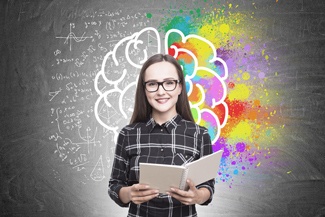 Adolescence… we’ve all lived through this period characterized by profound physical, emotional, and cognitive changes… a period that’s also marked by a great potential for neuroplasticity. To shine greater light on brain development during this period, researchers at the University of Oslo (Norway) studied fMRI data from more than 700 people. Read on to discover the changes that take place in a teenager’s brain.
Adolescence… we’ve all lived through this period characterized by profound physical, emotional, and cognitive changes… a period that’s also marked by a great potential for neuroplasticity. To shine greater light on brain development during this period, researchers at the University of Oslo (Norway) studied fMRI data from more than 700 people. Read on to discover the changes that take place in a teenager’s brain. To characterize age-related differences in functional connectivity in the adolescent brain, Norwegian researchers studied fMRI data recorded during a state of rest and during a cognitive task designed to solicit working memory. The data came from a previous ...
Can a poorly knotted tie be dangerous to your health?
 Has the tie become a dangerous gift to give to a man? We’re not talking about whether it’s his style, but indeed whether it poses a real danger to his health. Neurologists at the Schleswig-Holstein University Hospital in Germany conducted a study to evaluate the effects of this clothing accessory on the brain. Can wearing a tie really be dangerous?
Has the tie become a dangerous gift to give to a man? We’re not talking about whether it’s his style, but indeed whether it poses a real danger to his health. Neurologists at the Schleswig-Holstein University Hospital in Germany conducted a study to evaluate the effects of this clothing accessory on the brain. Can wearing a tie really be dangerous? “The knot is to the tie as the brain is to the man,” said François de La Rochefoucauld. But you still have to know how to tie it! The Windsor knot (the most common) was chosen for the study reported here. The German researchers recruited 30 young men and divided them into two groups: “necktie” and “no necktie.” ...
Can infants distinguish a good leader from a bully?
 “Bed time!” Imagine 21-month-old babies watching a short cartoon where characters interact with someone who asks them to go to bed. This protagonist may be depicted either as a good leader or as a despot. From this experiment, the researchers tried to determine if infants are capable of distinguishing between a good leader and a bully.
“Bed time!” Imagine 21-month-old babies watching a short cartoon where characters interact with someone who asks them to go to bed. This protagonist may be depicted either as a good leader or as a despot. From this experiment, the researchers tried to determine if infants are capable of distinguishing between a good leader and a bully. The study, carried out by researchers from the Department of Psychology and Cognitive Science at the University of Trento (Italy) and from the Department of Psychology at the University of Illinois (USA) focused on the distinction between these two major types of social power. One is based on authority, the other on intimidation. Previous studies ...
Learning music: a good way to develop executive function?
 While at the beginning it may be painful to the ears of those around us, learning to play a musical instrument can not only offer personal fulfillment, it may also be beneficial to our brains. A new study published in the review Plos One has shown that early musical training could even optimize the development of executive function in children. Let’s take a look at the research.
While at the beginning it may be painful to the ears of those around us, learning to play a musical instrument can not only offer personal fulfillment, it may also be beneficial to our brains. A new study published in the review Plos One has shown that early musical training could even optimize the development of executive function in children. Let’s take a look at the research.Executive functions are complex cognitive functions that help us manage voluntary and organizational behaviors. They come into play when we are facing a novel or non-routine situation and involve three processes: inhibition (to prevent or stop us from producing a response), flexibility (to change from one ...
Do bees understand zero?
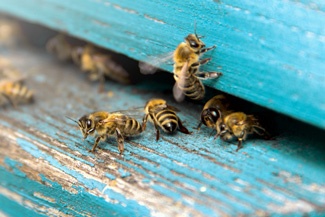 Beekeepers have been denouncing the neurotoxic products that threaten our bee populations for years, and for good reason. In addition to their crucial role in pollination, bees also make terrific subjects for animal cognition research. A team of Franco-Australian researchers recently studied these insects' understanding of the concept of zero. More broadly, they wanted to answer the question: are bees capable of mathematical abstraction?
Beekeepers have been denouncing the neurotoxic products that threaten our bee populations for years, and for good reason. In addition to their crucial role in pollination, bees also make terrific subjects for animal cognition research. A team of Franco-Australian researchers recently studied these insects' understanding of the concept of zero. More broadly, they wanted to answer the question: are bees capable of mathematical abstraction?According to the study’s authors, "zero" is a mathematical concept that's not easy to understand. They remind readers that it takes children several years to master. Indeed, the “void” isn’t naturally associated with a mathematical concept; ...
Does stress affect our cognitive abilities?
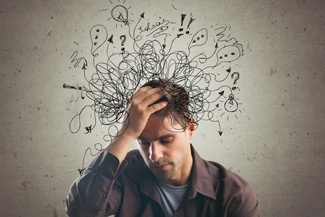 At reasonable levels, stress can be a motivator and a means to excel. But you have to be able to manage in order to reap the benefits. A team of researchers from the University of Pennsylvania recently examined the effects of anticipated stress on cognition. In concrete terms, the scientists measured whether, beginning upon waking, stressing about what might happen to us during the day had an impact on cognitive abilities.
At reasonable levels, stress can be a motivator and a means to excel. But you have to be able to manage in order to reap the benefits. A team of researchers from the University of Pennsylvania recently examined the effects of anticipated stress on cognition. In concrete terms, the scientists measured whether, beginning upon waking, stressing about what might happen to us during the day had an impact on cognitive abilities.General Adaptation Syndrome, or GAS (the scientific name for stress), was clearly identified in 1936 by Professor Hans Selye. According to the endocrinologist, GAS is a set of physiological responses the body goes through when subjected to environmental ...
Which human emotions are dogs most sensitive to?
 Through contact with humans, dogs have developed socio-cognitive skills that allow them to communicate with us. For example, they are able to distinguish different emotions on our faces. A recent study carried out by the University of Bari (Italy) tried to determine whether dogs were more “sensitive” to particular emotions. Are dogs more “receptive” to a face that demonstrates fear, surprise, anger or sadness? Read on to find out.
Through contact with humans, dogs have developed socio-cognitive skills that allow them to communicate with us. For example, they are able to distinguish different emotions on our faces. A recent study carried out by the University of Bari (Italy) tried to determine whether dogs were more “sensitive” to particular emotions. Are dogs more “receptive” to a face that demonstrates fear, surprise, anger or sadness? Read on to find out. Research has already demonstrated that canines process human faces in the same way we do: by analyzing facial features (mostly the eyes, nose, and mouth). This is how they are able to recognize familiar faces, distinguish neutral or emotional ...
Is feeling young good for the brain?
 Sure, we all age. But each of us perceives the passing years very differently. For example, are you one of those people who feels younger than their age? If you are, the “rejuvenation” you feel could be beneficial to your brain. For the first time, a South Korean study has highlighted the link between our subjective age and brain aging. Does feeling younger than we really are support cognitive health?
Sure, we all age. But each of us perceives the passing years very differently. For example, are you one of those people who feels younger than their age? If you are, the “rejuvenation” you feel could be beneficial to your brain. For the first time, a South Korean study has highlighted the link between our subjective age and brain aging. Does feeling younger than we really are support cognitive health? Why do some people feel younger or older than their real age? This is the question behind the research conducted by a team of scientists from the departments of psychology and sociology at the National Universities of Seoul and Yonsei in South Korea. The age we feel, or our ...
Are social ties the keys to cognitive health?
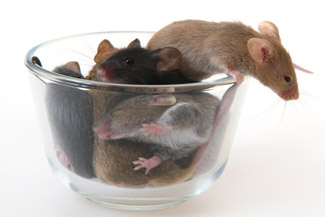 Having a large social network is one of the factors that may contribute to a healthy brain. But the benefits of maintaining or expanding social connections hasn’t received much research attention. One study has recently done just this by examining these ties between our social network and cognitive health. While it focuses on mice, it may still offer interesting information on one of the possible keys to brain health in humans.
Having a large social network is one of the factors that may contribute to a healthy brain. But the benefits of maintaining or expanding social connections hasn’t received much research attention. One study has recently done just this by examining these ties between our social network and cognitive health. While it focuses on mice, it may still offer interesting information on one of the possible keys to brain health in humans. Few animal studies have looked into the potential neuroprotective effects of a social network. Moreover, the little research that does exist mostly compares socially isolated animals to those living in groups. Until now, in both rodents and humans, ...
Can animals mentally replay past events?
 It’s the end of the day: you’re going home, but when you’re about to open the front door, you can't find your keys! Don’t worry, thanks to your episodic memory, you’ll be able to recall all of the specific events you experienced today. And by going back in time, you'll eventually find your keys and return home. We humans are indeed able to replay past episodes from our lives. But what about animals? Research has revealed that rats also share this ability.
It’s the end of the day: you’re going home, but when you’re about to open the front door, you can't find your keys! Don’t worry, thanks to your episodic memory, you’ll be able to recall all of the specific events you experienced today. And by going back in time, you'll eventually find your keys and return home. We humans are indeed able to replay past episodes from our lives. But what about animals? Research has revealed that rats also share this ability. As you know, memory comes in many forms, and our episodic memory allows us to mentally travel in time; our episodic memories are characterized by the repetition of several unique events in sequential order. And the ...
Is our brain like a bee colony?
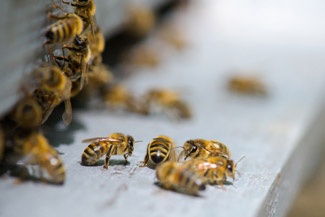 Besides the need to protect them because they play a fundamental role in pollination (which is essential to the survival of many plant and animal species), bees can tell us a lot about how our brains work. A research team from Sheffield studied their behavior and discovered analogies to the way our neurons interact during the decision-making process. How can a colony of bees be related to the human brain?
Besides the need to protect them because they play a fundamental role in pollination (which is essential to the survival of many plant and animal species), bees can tell us a lot about how our brains work. A research team from Sheffield studied their behavior and discovered analogies to the way our neurons interact during the decision-making process. How can a colony of bees be related to the human brain?A colony of honeybees works as a whole; each of its members depends on the others for survival. This specificity, also found in ants, intrigued scientists, especially those interested in psychophysics. This science studies the links between physical stimuli and the resulting ...
Does working on the top floor of a building increase risk-taking?
 Tell me which floor your office is on and I’ll tell you how risky your investment proposal is! While we might prefer otherwise, we all know that investment and legal decisions aren't always completely objective, especially because they are linked to the personalities of the actors involved. And a new and unexpected factor has just been unveiled in a study published in the Journal of Consumer Psychology: the altitude at which we make a financial decision. Let’s see the full details.
Tell me which floor your office is on and I’ll tell you how risky your investment proposal is! While we might prefer otherwise, we all know that investment and legal decisions aren't always completely objective, especially because they are linked to the personalities of the actors involved. And a new and unexpected factor has just been unveiled in a study published in the Journal of Consumer Psychology: the altitude at which we make a financial decision. Let’s see the full details. The research team led by Sina Esteky, an assistant professor of marketing at Miami University’s business school, first looked at data from more than 3,000 hedge funds from 2013 (500 ...
Can virtual reality improve learning?
 Welcome to the virtual palace of memory. In this special place, you may meet Michael Jackson, Napoleon Bonaparte, Donald Duck or even Martin Luther King Jr. There are two ways to visit: on a computer screen where you move around using your mouse; or using a virtual reality headset where you are completely immersed in the environment. And if at the end of the visit, we asked you to remember where you had seen the different characters, in which one of these visiting modes do you think you would remember best?
Welcome to the virtual palace of memory. In this special place, you may meet Michael Jackson, Napoleon Bonaparte, Donald Duck or even Martin Luther King Jr. There are two ways to visit: on a computer screen where you move around using your mouse; or using a virtual reality headset where you are completely immersed in the environment. And if at the end of the visit, we asked you to remember where you had seen the different characters, in which one of these visiting modes do you think you would remember best?Virtual reality is a computer technology that allows users to physically dive into an artificial environment that reproduces sensory experiences, including sight, sound, touch ...
How does a soccer fan's brain work?
 With the FIFA World Cup taking place in Russia, we thought it was an appropriate time to take a look at this study published in Scientific Report in November 2017. Whether you’re a soccer fanatic or not, discover what happens in the brain of a soccer fan who feels they're part of a group, a family. What sorts of altruist behavior do they show?
With the FIFA World Cup taking place in Russia, we thought it was an appropriate time to take a look at this study published in Scientific Report in November 2017. Whether you’re a soccer fanatic or not, discover what happens in the brain of a soccer fan who feels they're part of a group, a family. What sorts of altruist behavior do they show?Belonging to a group is considered to be a basic human need. Research has shown that humans have a tendency to favor their ingroup, or the group to which one belongs. In this area, soccer fans provide extraordinary research subjects. Their behaviors show their strong attachment to the group, their real and constant solidarity. But ...
Can we transfer memories from one living being to another?
 David Glanzman expects to see a lot of surprise and skepticism in response to the study discussed here. He and his colleagues at the University of California, Los Angeles have managed to transfer memories from one sea snail to another. Their experiment raises questions about our conception of memory, something which was little debated in the (neuro) scientific community until now. Let’s take a look at why this transfer of memory in mollusks should be approached with care.
David Glanzman expects to see a lot of surprise and skepticism in response to the study discussed here. He and his colleagues at the University of California, Los Angeles have managed to transfer memories from one sea snail to another. Their experiment raises questions about our conception of memory, something which was little debated in the (neuro) scientific community until now. Let’s take a look at why this transfer of memory in mollusks should be approached with care.Before delving into the experimental details and the debate they provoke, it should be noted that the research conducted by Glanzman focuses on the study of the engram, a biological trace of memory in the ...
Can friendship be seen in the brain?
 Birds of a feather flock together. Can this popular saying be seen in the brain? Empirically speaking, sociology has shown that we associate with people that are like us; something known as (social) homophily. American researchers have studied this phenomenon on a neural level. As incredible as it may seem, they were able to identify a person’s friends by analyzing their reactions in the brain while watching video clips! Let’s take a closer look.
Birds of a feather flock together. Can this popular saying be seen in the brain? Empirically speaking, sociology has shown that we associate with people that are like us; something known as (social) homophily. American researchers have studied this phenomenon on a neural level. As incredible as it may seem, they were able to identify a person’s friends by analyzing their reactions in the brain while watching video clips! Let’s take a closer look. The intuition that we tend to choose friends who are like ourselves has been confirmed through research on homophily. The sociological variables that help forge social ties include social origin, age, education, place of ...
Do jazz and classical pianists' brains work the same way?
 It may be an anachronism, but if Duke Ellington and Wolfgang Amadeus Mozart had to play the same piece of music, do you think their brains would show similar activity? According to a study published in NeuroImage, the brains of jazz pianists don't operate quite the same way as their classical counterparts. But why would a musician's brain activity change depending on the kind of music they play?
It may be an anachronism, but if Duke Ellington and Wolfgang Amadeus Mozart had to play the same piece of music, do you think their brains would show similar activity? According to a study published in NeuroImage, the brains of jazz pianists don't operate quite the same way as their classical counterparts. But why would a musician's brain activity change depending on the kind of music they play?Playing music requires highly developed brain structures with complex interactions between various abilities, and musical training induces sensorimotor plasticity. Previous research has already established that, for certain tasks, the brains of musicians work differently than those of ...







